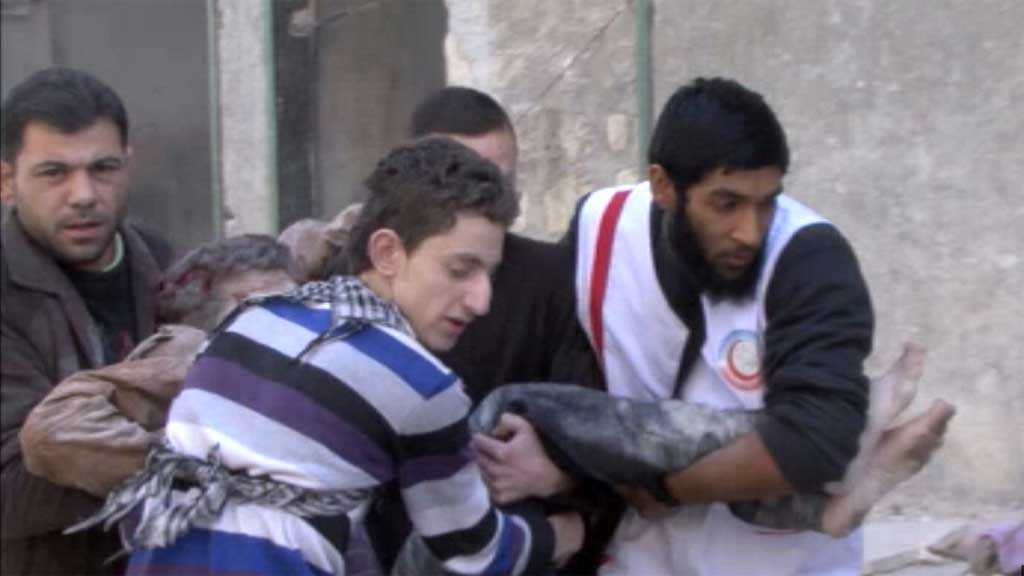Syria war: British Muslims on the front line
 Darshna Soni
Communities Editor
Darshna Soni
Communities Editor
Channel 4 News speaks to a couple from Essex who say they have left their old lives behind to become charity workers on the front line in Syria’s civil war.
This report was filmed by Bilal Abdul Kareem, an American Muslim activist living in Syria who documents the lives of fighters and aid workers.
The ambulance hurtles along a tiny back street, the driver frantically beeping the horn, swerving as he tries to avoid huge piles of rubble, writes Home Affairs Correspondent Darshna Soni.
“We can’t go any further, let’s just jump out here.” When the driver shouts, the first thing you notice is his Essex accent. He runs towards the chaos. A barrel bomb has just exploded in eastern Aleppo, and an injured man has blood pouring down his face.
“I’ve got him, quick, quick, back to the ambulance.” Tauqir Sharif has no medical training. Yet this Essex lad from Chingford is on the front line of Syria’s relentless conflict.
Adrenalin junkie
“I’m one of those people, it’s either a hundred per cent or it’s nothing. I was always a bit of an adrenalin junkie, into bungee jumping, sky diving, things like that.”
The 27-year-old graduate used to work as a gas engineer. He only ever meant to come to Syria for a few weeks, to help deliver an aid convoy. That was two years ago. He ended up staying, his bright yellow London ambulance an incongruous sight on the streets of this ancient city.
Channel 4 News filmed with Tauqir and spoke to him about what motivated him. “I feel the whole world has turned a blind eye to Syria. We don’t want to be sitting here in five years’ time, wondering why we didn’t prevent another genocide. I feel it’s the duty of all Muslims to help.”
Religious obligation
The Nottingham University graduate believes he has a religious obligation, but an obligation based on his very British upbringing. “I grew up in an ordinary, middle-class family. But we were always taught, growing up in the UK, that if we see injustice, we should step in and do something about it.”
Tauqir lives near the Turkish border with his British wife Racquell Hayden-Best, who is 21. When they married three years ago, he already had a long history of activism – he was one of those aboard the Gaza aid flotilla which was raided by Israeli forces in 2010.
He has campaigned to raise awareness about Syria and met the former Guantanamo detainee Moazzam Begg when Mr Begg visited Syria last year. They were due to speak at a live online “webinar” event about the conflict, but it was cancelled after Mr Begg was arrested and charged with Syria-related offences.
Racquell says she was keen to travel with him to Syria, despite the dangers. “I had a very protected upbringing,” she says. “I wanted to get out and see the world. Life in the UK, it was depressing, it was like a robot life, doing the same things every day. Now Tauqir is doing what he wants to do. I’m happy because he’s happy.”

The couple work with a number of different charities, including a project to build an Islamic school for women and children. “We want to teach them Islamic studies,” says Racquell. “I feel it’s important as a woman I should be here and show the support to the sisters.”
They say they’re regularly sent donations from across the UK. Tauqir shows us around his warehouse, which is packed full of nappies, dried foods and other supplies. “We always get sent baked beans, even though many of the Syrians we donate them to aren’t sure what to do with them. They always drain the sauce out!”
But Tauqir claims some charities are now nervous about working with them – after increased scrutiny of aid groups by the British authorities. The Charities Commission has warned that some jihadis may be exploiting aid convoys as a way of entering Syria and that donations may end up in the hands of extremist fighters.
Threat to the UK
There’s a fear that if those fighters then return, they could pose a threat to the UK. And so the Home Office has announced anyone travelling to Syria faces arrest and could even lose their passport.
“I can’t believe we’re having this discussion, about removing people’s citizenship. It’s creating an atmosphere of fear which even we are feeling, even though we are humanitarian workers.”
The couple fear that they too could face arrest if they ever return. “I’m not a fighter,” Tauqir tells us. “But I do follow the opinion that some of the people being branded as terrorists should be hailed as heroes.
“If they are putting lives on the line, to save people like those we saw injured in the bomb, in my book that’s something praiseworthy. “
Tauqir says he would like to return home one day – but for now, he wil stay in Syria until – if – this war ends.